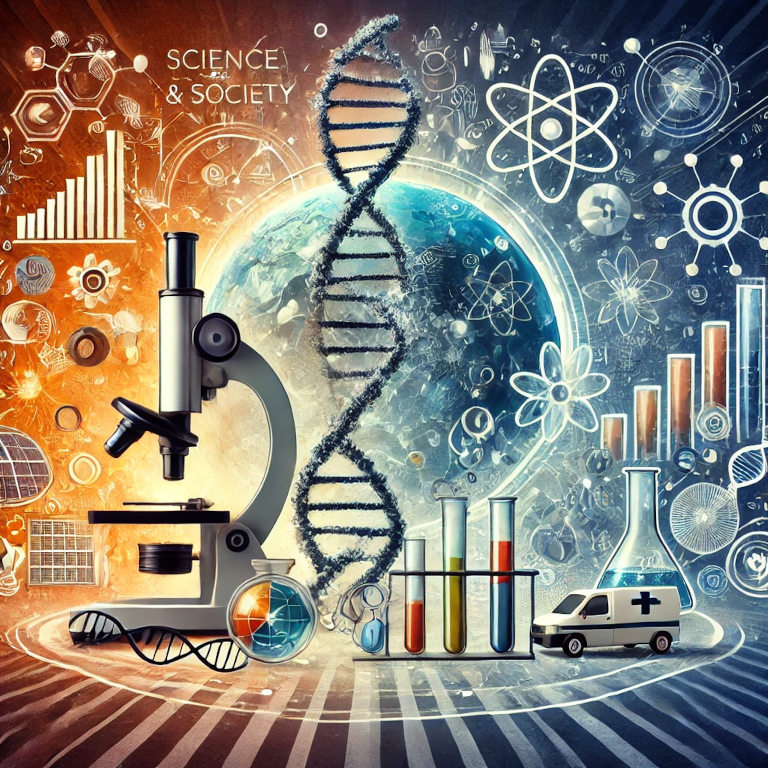Science and society are inextricably linked, with scientific advancements continuously shaping and improving the world around us. From healthcare and technology to environmental sustainability and social structures, science plays a crucial role in advancing our understanding and enhancing our quality of life. This article delves into the intricate relationship between science and society, highlighting key areas where science has made significant contributions and continues to drive progress.
The Role of Science in Society
Science serves as a foundation for modern society, providing the knowledge and tools necessary to address complex challenges and drive innovation. Its impact can be observed in several critical areas:
- Healthcare and Medicine: Scientific research has led to groundbreaking discoveries in medicine, improving health outcomes and extending life expectancy. Innovations such as vaccines, antibiotics, and advanced diagnostic tools have revolutionized healthcare, reducing the prevalence of infectious diseases and improving the management of chronic conditions.
- Technology and Innovation: Science drives technological advancements that transform everyday life. From the internet and smartphones to renewable energy sources and artificial intelligence, scientific research fuels the development of new technologies that enhance productivity, connectivity, and overall quality of life.
- Environmental Sustainability: Understanding ecological systems and human impact on the environment is essential for sustainable development. Scientific research informs policies and practices aimed at conserving natural resources, reducing pollution, and mitigating climate change, ensuring a healthier planet for future generations.
- Education and Knowledge: Science education fosters critical thinking, problem-solving skills, and a deeper understanding of the natural world. It empowers individuals to make informed decisions and encourages a culture of curiosity and lifelong learning.
- Social Progress: Science contributes to social progress by addressing societal issues such as poverty, inequality, and human rights. Research in social sciences and humanities enhances our understanding of human behavior and social dynamics, guiding policies and interventions that promote social justice and well-being.
Key Contributions of Science to Society
1. Medical Advancements
One of the most profound impacts of science on society is in the field of medicine. Medical research has led to the development of treatments and interventions that save lives and improve health. For example:
- Vaccinations: Vaccines have eradicated or significantly reduced the prevalence of deadly diseases such as smallpox, polio, and measles.
- Genetic Research: Advances in genetics have paved the way for personalized medicine, allowing for tailored treatments based on an individual’s genetic makeup.
- Medical Imaging: Technologies such as MRI, CT scans, and ultrasound provide detailed insights into the human body, aiding in accurate diagnosis and treatment planning.
2. Technological Innovation
Technological progress driven by scientific research has transformed various aspects of daily life. Notable innovations include:
- The Internet: Revolutionizing communication, information access, and commerce, the internet has become an integral part of modern society.
- Renewable Energy: Advances in solar, wind, and hydroelectric power are helping to reduce reliance on fossil fuels and combat climate change.
- Artificial Intelligence: AI is enhancing fields such as healthcare, finance, and transportation, providing new solutions to complex problems.
3. Environmental Conservation
Science plays a critical role in understanding and addressing environmental challenges. Key contributions include:
- Climate Science: Research on climate change informs global efforts to reduce greenhouse gas emissions and adapt to changing environmental conditions.
- Conservation Biology: Studies on biodiversity and ecosystems guide conservation efforts to protect endangered species and habitats.
- Sustainable Agriculture: Advances in agricultural science promote sustainable farming practices that increase food production while minimizing environmental impact.
4. Educational Advancements
Science education is essential for fostering a knowledgeable and informed society. Contributions to education include:
- STEM Education: Emphasizing science, technology, engineering, and mathematics (STEM) education prepares students for careers in high-demand fields and drives innovation.
- Research and Development: Universities and research institutions conduct cutting-edge research that expands our understanding of the world and drives technological progress.
- Public Engagement: Science communication initiatives and public outreach programs make scientific knowledge accessible to broader audiences, promoting science literacy.
The Future of Science and Society
The relationship between science and society will continue to evolve as new discoveries and innovations emerge. Key areas of focus for the future include:
- Sustainable Development: Balancing economic growth with environmental conservation will be crucial for ensuring a sustainable future.
- Healthcare Innovations: Continued advancements in biotechnology, genomics, and telemedicine will transform healthcare delivery and improve patient outcomes.
- Digital Transformation: The integration of digital technologies into various sectors will drive efficiency, connectivity, and access to information.
- Global Collaboration: International cooperation in scientific research will be essential for addressing global challenges such as pandemics, climate change, and resource scarcity.
Summary
Science and society are deeply interconnected, with scientific advancements driving progress across various domains. From healthcare and technology to environmental sustainability and education, science plays a pivotal role in shaping the modern world. By continuing to invest in scientific research and fostering a culture of curiosity and innovation, we can address complex challenges and build a brighter future for all.






